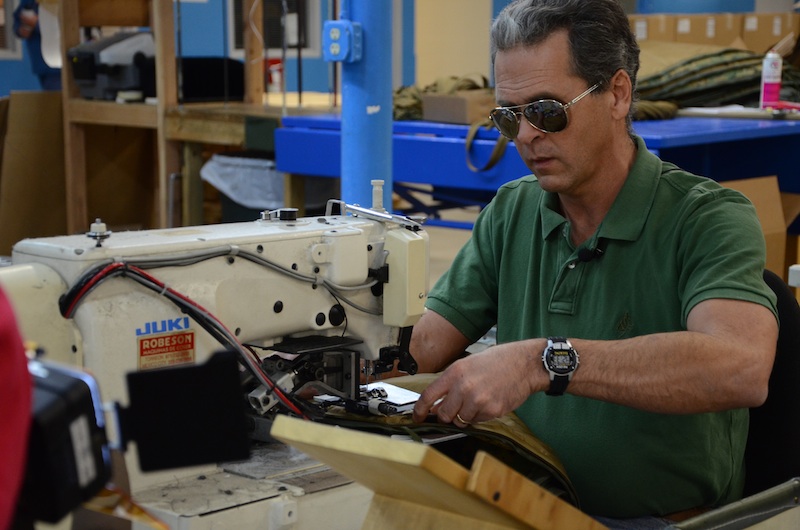With an oven, microwave, refrigerator and stove, the training kitchen inside of Mission Health’s recently opened Low Vision Center looks no different from any other kitchen. However, for Tony West, he sees the kitchen differently — primarily through smell and touch.
After he lost his vision in a car crash more than 25 years ago, West had to relearn everything from mobility to housekeeping.
“I went through a big adjustment period,” he recalls. But he adds, “There’s techniques and ways to do pretty much anything if you know what they are.”
And West is not the only person who wrestles with these vision issues. An estimated 193,000 people in Western North Carolina, eastern Tennessee and western South Carolina are experiencing significant vision loss.
To accommodate this need, Mission Health opened its Low Vision Center on Nov. 1 at the Industry for the Blind’s Asheville facility on Sardis Road to help others like West learn what options they have during these adjustment periods. As low vision optometrist Dr. Susan Wise explains, the center focuses on life after the diagnosis, not the diagnosis itself.
“Our exam is about functionality. We’re not looking at what disease has occurred in this patient, but how much vision they have left; what can we do to enhance the remaining vision. We work with devices to see how much magnification a person may need; what devices may help to improve their quality of life,” she says.
For example, people with low or no vision can still use computers with the help of JAWS, a computer screen-reader program. Before technology like this, Wise says people had to depend on, “hand magnifiers, stand magnifiers; the old-timey magnifiers.”
But it’s not just about using technology — it’s about using what vision is left in hopes of living an independent life. Cheryl Mott works as an occupational therapist and certified low vision therapist. In her own words, Mott describes her job as, “the fun part.”
“I get to work with the client on what their goals are because somebody’s goal might be to go back to fishing and they can’t see the lures anymore, or they’re worried about falling off the end of the dock kind of thing. Or I can work with someone on using the bioptics to watch their grandchild play football, or if it’s a child being able to see the board,” she explains.
To help people achieve these goals, she does various tests and exercises. Flipping through a series of words in a book, she explains how it measures contrast. As the text gets fainter, she explains why this is important.
“We see what percentage they can do because we know that a newspaper is written in a certain percentage contrast. So we know if they can’t read this,” she says as she flips to the next page, “then we know the newspaper’s not going to be dark enough.”
In addition to having access to doctors like Wise and therapists like Mott, the Low Vision Center also features a training kitchen, computer training lab, an audio book lending library and a retail store.
According to Randy Buckner, director of Asheville Operations at Industries for the Blind, he says he hopes the new center will let people know about Industries For the Blind, a not-for-profit business that provides jobs to people who are blind or visually impaired. Buckner, who has worked at the local IFB for more than 20 years says it’s Asheville’s best-kept secret. However, he hopes it does not remain secret for much longer.
“This service is available there are so many people that are visually impaired or blind that don’t know these things are available, and if you don’t know if something’s available then you don’t know how to receive it,” he says.
For West, labeling poncho liners at IFB gives him the opportunity to keep living on his own despite his vision loss more than 25 years ago. He says he hopes the new center will show people with low or no vision that they have options, but that it will also show the sighted community that they are valuable and capable.
“You can come out and see what people with vision problems can actually do, and also you can learn about the technology that’s available for people,” he say. “It’s great to be able to work and to give back to the community.”
Caitlin Byrd can be reached at cbyrd@mountainx.com, or 251-1333, ext. 140.






Before you comment
The comments section is here to provide a platform for civil dialogue on the issues we face together as a local community. Xpress is committed to offering this platform for all voices, but when the tone of the discussion gets nasty or strays off topic, we believe many people choose not to participate. Xpress editors are determined to moderate comments to ensure a constructive interchange is maintained. All comments judged not to be in keeping with the spirit of civil discourse will be removed and repeat violators will be banned. See here for our terms of service. Thank you for being part of this effort to promote respectful discussion.